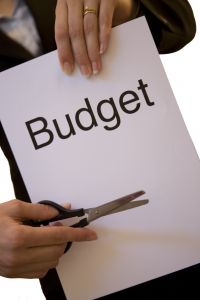|
Getting Out of Debt_3a is Harder When Budget Is Busted - What To Do

Custom Search
Getting out of debt_3a required a budget back when we were on Step 1 so we created it. Sometimes though we spend beyond it and therein lies the trouble. But this is not the end of the world as long as we take action on correcting the situation. The first thing to do is to pinpoint the reason why the budget is broken. In other words why did we end up with a busted budget? One budget buster is an impractical budget. The budget could be an unrealistic one and does not cover all the essentials of daily living. There could also be the lack of motivation in helping make the budget work to the point the commitment to stick to it is quite a hurdle. These are not easy challenges to meet but there are strategies we can use and questions to clarify all of which will show how it is possible to be getting out of debt_3a, save money and enjoy the good life. 1. One question to clarify so we can stick to our budget better is how much money to assign to getting out of debt_3a. Some require definite amounts while others like credit cards do not, but just remember don’t allot money for investments if you still have Credit card debt because the interest on this will be more than you will ever earn on the investment. Then some fixed period loans from other creditors will allow you to pay more on the debt and you may do this if you no longer have credit card debt. Make sure if you are allowed to pay more, that you will not be hit by pre-payment penalties. If you have too many loans, try a consolidation loan so it will be more manageable to pay them off with one monthly payment. When you opt in for a consolidation loan, make sure you do not use any credit cards or get any more loans until you have paid off this consolidation loan. 2. Another question that if left unanswered will make sticking to a budget difficult is that we always seem to have more wants and expenses that are not in the budget. This is a common problem that thankfully is easy to correct. A good budget should have a category called Miscellaneous under which all uncommon expenses fall under. Just total the unlikely expenses in the last few months, find the average and put that under miscellaneous expenses.
The solution could also be as simple as looking over your budget to check for missing categories or where you underestimated the expenses. Also items as travel and gifts, eating out and impulse buys should be part of a budget. Otherwise you will find yourself overspending the budget that will make you lose interest in committing to it. 3. Still another question is on how much money to allocate for investments. There are many factors to consider here: liquidity needs, disposable income and age. Liquidity refers to how fast an investment can be converted into cash. Since the interest on the investment you make will depend on the personal liquidity requirement, it is best to check this now before starting any investments. The longer the time horizon is, the better rate one could get from the investment vehicle. Disposable income will also determine how much to allocate to investment. If you need your money right now to survive, then obviously the available money for investment will be limited. There are four ways to increase your disposable income which your budget may need more of and they are: 1. Get a second job or a raise. 2. Invest your income. 3. Start a small business and 4. Spend less which I believe is the best as it does not need extra time and effort on your part. When it comes to investment allocation, age matters with the younger able to invest less but can have higher equity allocations. Those in their 50s who do not have enough retirement assets should invest more. There is no one-size that fits all so work with a financial planner or retirement advisor. 4. As to the question of how much to overpay your mortgage (only if it is allowed of course and is a conventional mortgage), pay all the debts with higher interest rate first. In addition there should be a two or three month emergency fund first before overpaying the mortgage. The lower the interest rate, the better it is to invest the extra money. But then if your situation is such that you will benefit from the deductibility of your mortgage interest, then find out from a financial planner. 5. People have this question in mind. How can they maintain and keep their budget up-to-date? It is wise to review the budget along with the account statements often during the first few months to see how much was spent on different categories and compare them with the budgeted amounts. Make some adjustment if necessary, so getting out of debt_3a will be a reality. Don’t be so difficult on yourself when it comes to budgeting. Add a little fun to the budget or you won’t completely commit to it. Check the budget to see where you can inject a little fun into it. If the budget is not current to what you want and need, then you will be having a tough time getting out of debt_3a. Tweet
Return from Getting Out of Debt_3a What To Do with a Busted Butget to Debt Challenges Home Page for the Disclaimer. Getting Out of Debt_3b Know how much do you really owe Getting Out of Debt_2 inThree Steps - Find Where You Can Save Getting Out of Debt_3 Why the Budget Does Not Work Sometimes Site Map of Debt Challenges for Easy Navigation

Custom Search

Copyright © 2008-2011 http://www.debtchallenges.com All Rights Reserved Recommended reading
|






